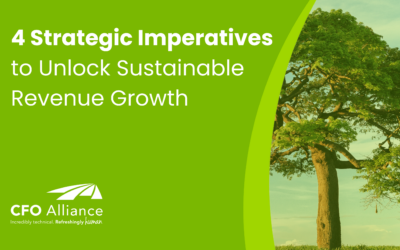How Innovative CEOs
Foster Partnerships With Their CFOs
The C-suite dream team
- The CFO Supports the CEO for Better Decision-Making
- The CEO & CFO Relationship Is Critical to Success
That Elusive, Crucial, Necessary “Spark”
It’s natural for entrepreneurs to run their businesses with a double helping of optimism, grit, and tenacity. Innovative founders are fully invested in their abilities to bring a product or idea to market. And they’re often right.
But sometimes, that optimism and grit can lead the business straight into dangerous territory.
“Risk-averse people don’t become entrepreneurs,” said Mark Swanson, Chairman of Vu Technologies and co-founder of a consulting company that advises startups on strategy and raising capital. “Entrepreneurs see things other people don’t, but they also tend to underestimate the effort, cost, and scope of work required to change market dynamics.”
That’s why successful innovative founders surround themselves with a team of people who add to their strengths. And that starts with the CFO.
How the CFO Supports the CEO for Better Decision-Making
Sonny and Cher. Michael Scott and Dwight Schrute. Bert and Ernie. Milk and cookies. The secret to these dynamic duos is that they each make the other better. Without their complementing partner, each individual might feel a bit like Michael Scott:
“I knew exactly what to do. But in a much more real sense, I had no idea what to do.” – Michael Scott, The Office
If we were betting people, we’d bet that every CEO has felt this way at some point. That’s why they need the input of a talented CFO who shares a vested interest in the company. When the chemistry is right, the CEO and CFO build on each other’s strengths as they work together toward the success of the business. They share traits like courage, optimism, discipline, and strong people skills, and they know how to make tough calls when necessary.
But CFOs also have critical strengths that some CEOs may not, such as:
Financial Strategy
The CFO is a numbers person, but he or she also needs to articulate why those numbers matter. It’s not enough just to balance the books. An effective CFO thinks about the long-term effects – good and bad – of any given course of action and can explain why that action is a good or bad idea for the business.
Financial Leadership
Putting the right financial structures and processes in place from the outset will ensure that the company is ready for each successive stage of growth, from start to scale to exit. Without the leadership of a strong CFO, the company may be left floundering when it’s time to think about expansion or M&A.

Appropriate Counterbalance
The CFO should know when and how to push back when an idea isn’t financially viable. They need a thick skin, and they need to know how to interact with the CEO in a constructive way, so that the relationship doesn’t become adversarial.
Data-Based Insights
Metrics alone won’t move the needle. Successful CFOs know how to identify which metrics the company needs to work on at a given time and how to take the steps needed to drive growth. This means having a firm grasp on enterprise-wide data, capital market trends, and customer activity to support better decision-making.
But even when all these things are present, the relationship between the CEO and the CFO still needs another ingredient to succeed.
That ingredient is chemistry.
Why Chemistry
Between the CEO & CFO Is Critical to Success
Experienced entrepreneurs value having a CFO that can offer an alternative point of view when stakes are high. When the CEO is ready to leap, the CFO makes sure he or she is leaping in the right direction. That means the CFO needs strong convictions and should be able to clearly articulate the reasons for an alternate course of action in terms of business strategy.

CEO & CFO: The All-Star Dream Team
“The goal of the CFO is to counterbalance the tendency of the CEO to do risky things or act without enough information,” said Swanson. “The problem is that this can set up an adversarial relationship because the CFO is driven by numbers and hard facts, while the CEO is driven by optimistic beliefs and ideas. Ideally, the CFO should act as the advisor to make sure the company isn’t moving ahead too fast. To have this type of relationship, you need to have different points of view, but also shared values, trust, and motivations.”
In other words, the CFO says no at strategic times so that they can say yes with confidence when the time is right.
The CEO, on the other hand, must be willing to hear the perspective of the CFO. That requires a level of maturity as well as a good knowledge of people.
The Milk to Your Cookies
The bottom line is that hiring a CFO for a startup isn’t just about financial credentials. It’s also about strategic leadership and the ability to work in tandem with the founder. It’s about the push and pull between vision and execution. And when it all comes together, the company flourishes.
We understand the importance of working in tandem, and we bring you a total package of strategic financial leadership that gets you where you want to go. Whether you’re ready to start, scale, or exit, we’ll do what it takes to make your vision prosper.
Ready to see what having a full team of financial leaders working alongside you can do for your organization?
Call us to start the conversation!
Related Post
4 Strategic Imperatives to Unlock Sustainable Revenue Growth
4 Strategic Imperatives to Unlock Sustainable Revenue GrowthCreating long-term, sustainable revenue growth takes more...
Future-Proof Your Workforce with a Modern Talent Agenda
Future-Proof Your Workforce with a Modern Talent AgendaWhat does the future of talent look like? It’s a fair question,...
The Talent Behind the Tech: How Skills-Based Hiring Supports Technology Innovation
The Talent Behind the Tech: How Skills-Based Hiring Supports Technology InnovationStaying relevant with technology in...



